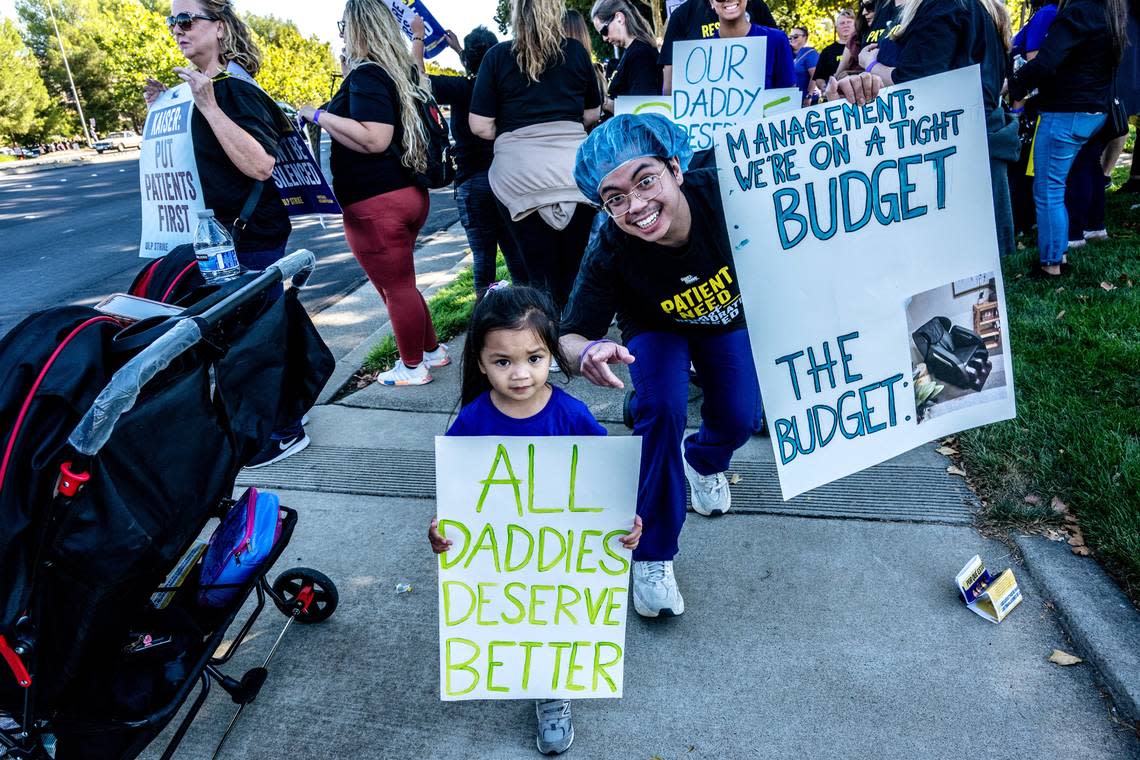California health care workers win $25 minimum wage under bill signed by Gavin Newsom

Hundreds of thousands of health care workers in California are set to earn a new minimum wage of $25 an hour.
Gov. Gavin Newsom announced Friday night that he signed Senate Bill 525, which provides a roadmap to a $25 minimum wage for direct patient care providers, such as nurses, physicians and medical residents. It also covers workers in support positions, such as janitors, housekeepers, food service workers, medical billing personnel and gift shop clerks.
The measure was carried through the Legislature by Los Angeles Democratic Sen. Maria Elena Durazo and backed by the state’s powerful unions, including the Service Employees International Union-United Healthcare Workers West.
Newsom’s signature comes at a turbulent moment for the health care sector. In the wee hours of Friday morning, Oakland-based Kaiser Permanente reached a “historic” labor agreement with 85,000 unionized workers after employees engaged in a three-day strike earlier this month. The tentative deal would guarantee California Kaiser employees a $25 minimum wage within three years. Acting U.S. Labor Secretary Julie Su helped the health provider and workers reach agreement.
SB 525 originally faced staunch opposition from the hospital industry, community clinics and dialysis centers. They ran attack ads alleging that said the measure would reduce health care access and cost $8 billion a year.
But a series of last-minute amendments and agreements, including a four-year ban on ballot initiatives and referendums brought by the unions or health care industry against one another, cleared the way for passage.
The amendments also introduced a three-tiered phase-in that would leave some workers at government-funded health facilities waiting 10 years to see the full $25 wage. Additional revisions made in the Assembly included a requirement to establish a waiver program by March so health facilities that are in financial distress can temporarily delay payroll hikes.
The amended measure cleared the Assembly with more than a two-thirds majority after the deal was struck. Prior to the amendments, it passed the Senate with the minimum number of votes.
Assemblywoman Megan Dahle, R-Bieber, stood firmly against the bill despite the pact between the unions and health industry. She called SB 525 a “one-size-fits-all” solution and said it would have “disastrous” consequences for rural communities like those in her sprawling North State district.
“This will, without a doubt, break rural hospitals,” Dahle said during floor debate on the final night of session last month. “I will be a strong ‘no.’ And hopefully, when something does detrimentally happen, the rest of you will stand with me when we need to fix it.”
A number of Democrats mentioned in their comments that they were initially skeptical of the bill. But, thanks to provisions that ease the financial burden for rural and community clinics, they felt they could support it.
“When I first heard about the bill, I said, ‘There’s no way that this can work for my communities,’” said Assemblyman Jim Wood, D-Healdsburg, whose North Coast district is mostly rural. “And I have to say I’m really impressed with the work that has gone into this.
“With all due respect to our colleague from Bieber, this is not a one-size-fits-all. There is no way I could stand up here and say that I’m supporting this bill tonight if it was.”
Large health care facilities (more than 10,000 full-time employees) and dialysis clinics would introduce a $23-per-hour minimum wage starting June 1, followed by $1 increases each year until $25 an hour is reached by mid-2026. Public health facilities run by counties whose population exceeds 5 million people are also included in this tier.
Hospitals that are largely government-funded, as well as those in small or rural areas, would introduce an $18-per-hour minimum wage in 2024. Over nine years, the wage would then increase 3.5% annually until it reached $25 an hour in 2033.
Community clinics would follow a schedule of $21 an hour in 2024, $22 an hour in 2026 and $25 an hour in 2027.
All other covered health facilities would see the minimum wage phased over five years — $21 an hour in 2024, $23 in 2026 and $25 in 2028.


